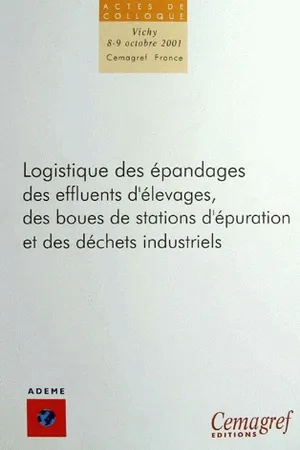
- English
- ePUB (mobile friendly)
- Available on iOS & Android
About this book
Cet ouvrage constitue les actes du colloque national consacré à cette problématique les 8-9 octobre 2001 à Vichy et à Montoldre, en partenariat avec de nombreux professionnels. Les communications proposées dressent un "état de l'art" destiné à un large public d'opérateurs privés et publics de cette filière: CUMA, ETA, constructeurs de matériel d'épandage, sociétés d'ingénierie des épandages, missions déchets des chambres d'agriculture, SATEGE, services déconcentrés de l'État, Agences de l'eau et collectivités territoriales... Les points essentiels concernent, l'organisation de la filière, les dispositifs de stockage, les matériels de transport, reprise, et épandage; l'organisation des campagnes et chantiers d'épandage, les outils de gestion des données, de traçabilité et de démarche qualité.
Frequently asked questions
- Essential is ideal for learners and professionals who enjoy exploring a wide range of subjects. Access the Essential Library with 800,000+ trusted titles and best-sellers across business, personal growth, and the humanities. Includes unlimited reading time and Standard Read Aloud voice.
- Complete: Perfect for advanced learners and researchers needing full, unrestricted access. Unlock 1.4M+ books across hundreds of subjects, including academic and specialized titles. The Complete Plan also includes advanced features like Premium Read Aloud and Research Assistant.
Please note we cannot support devices running on iOS 13 and Android 7 or earlier. Learn more about using the app.
Information
Table of contents
- Page de Copyright
- Page de titre
- Comité d’organisation
- Remerciements
- Sommaire
- Introduction
- Ouverture du colloque Intervention de Monsieur Jean-Claude SOUTY - Chef de bureau « Agronomie, ressources nouvelles et sols » Ministère de l’Agriculture et de la Pêche
- Journée du lundi 8 octobre 2001 - Séance plénière au palais des congrès de Vichy
- Journée du mardi 9 octobre 2001 - Forums et exposés à Montoldre
- Journées des 8 et 9 octobre 2001 - Les posters
- Journées du 9 octobre 2001 - Les ateliers
- Conclusion et principaux enseignements